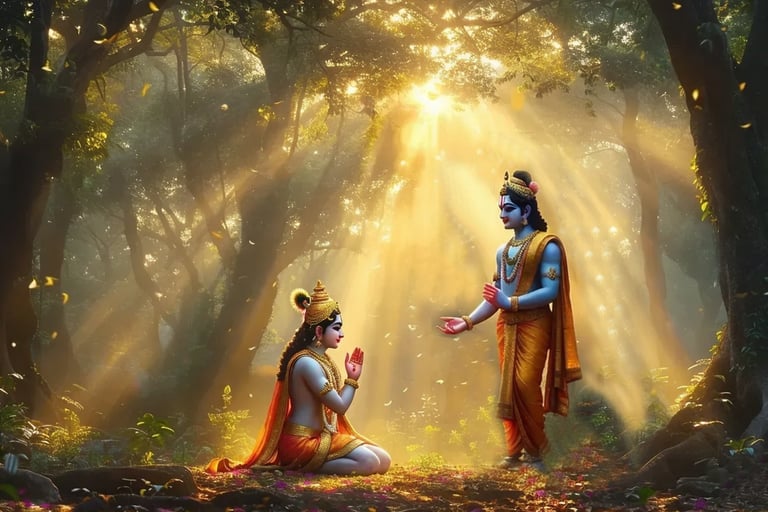Krishna, The Teacher
The Greatness of the Bhagavad Gita
TheVedicSite(c)2024


The Vedic texts are probably the richest source of ancient wisdom we have available on this Earth. The most famous discourse derived from those texts is The Bhagavad Gita. Often referred to as The Gita, The Bhagavad Gita is a sacred Vedic scripture that holds profound philosophical and spiritual significance that is still applicable today.
Composed around thousands of years ago, the Gita describes a section of an epic war known as The Kurukshetra War. which is featured in the famous sanskrit text "The Mahabharata". Through the dialogue between Prince Arjuna and Lord Krishna, who serves as his charioteer and spiritual guide on the battlefield, the Bhagavad Gita explores the nature of existence, the purpose of life, and the path to spiritual enlightenment. It encompasses a diverse range of topics including duty, morality, self realization, and the nature of Divine. The Bhagavad Gita continues to inspire and guide seekers of wisdom from various backgrounds around the world. Indeed, despite the Bhagavad Gita describing an important historical event at the cross of the Bronze age and the Iron Age aka Age of Darkness, it is mainly known today for its spiritual relevance.
Arjuna, a skilled warrior and a central figure of the war, finds himself morally conflicted and emotionally overwhelmed on the battlefield. Before the war begins, Arjuna experiences doubt and hesitates in fulfilling his duty as a warrior, as he recognises his relatives and loved ones amongst his opponents. It is at this critical juncture that Lord Krishna imparts spiritual wisdom and guidance to Arjuna, revealing profound truths about life, duty, and the nature of the self.
A central theme of what Lord Krishna relates to Arjuna is the concept of Dharma, often translated as "duty" or "righteousness." Lord Krishna emphasizes the importance of fulfilling one's moral obligations and responsibilities without attachment to the outcomes. The Gita teaches that true spirituality lies in performing one's duties selflessly and with dedication, irrespective of circumstances or personal preferences. By embracing Dharma, individuals contribute to the harmony and well-being of society whilst progressing on the path of spiritual growth.
Lord Krishna also elucidates various paths to attain spiritual liberation and how to realize one's true nature. Lord Krishna outlines three primary paths: Karma Yoga (the path of action), Bhakti Yoga (the path of devotion), and Jnana Yoga (the path of knowledge). Each path is distinct and suited to different individuals with different inclinations, but they ultimately converge to lead the seeker to the ultimate goal of self-realization and union with Divine.
Lord Krishna explains that the true self, known as the Atman, is eternal, indestructible, and beyond the physical body and mind. He unveils the concept of the immortal soul, which transmigrates from one body to another, experiencing life through various incarnations.
The Gita encourages individuals to recognize their Divine essence and transcend the limitations of the ego, realizing their oneness with the Supreme Consciousness.
Despite originating in ancient India, the Bhagavad Gita offers timeless wisdom and holds universal relevance. Its teachings transcend religious and cultural boundaries, resonating with seekers of truth across the Earth. The Gita addresses the perennial questions of human existence including the nature of life and death.
Krishna's teachings also touch upon the transient and cyclical nature of life. He explains the eternal nature of the soul (Atman) and the impermanence of the physical body. Krishna explains to Arjuna that death is merely a transition, a shedding of the mortal coil, and that the soul is immortal and indestructible. Understanding this fundamental truth helps Arjuna overcome the fear of death and accept his role in the grand tapestry of existence. Krishna tells him that nothing can be better for him than to be a warrior defending the cause of righteousness. Krishna explains to him that if he wins, he gets to enjoy a kingdom on Earth, and if he dies, he gets to enjoy Heaven.
Krishna emphasizes that all beings are essentially manifestations of the same Divine essence and that true wisdom lies in seeing this underlying unity. By transcending the ego and merging with the Divine consciousness, one attains moksha (liberation from the cycles of birth and death).
Krishna helps Arjuna and the reader to understand profound insights regarding the nature of the self and the ultimate reality. He reveals himself as the Supreme Being and gives Arjuna a cosmic divine vision of his universal form. This amazes Arjuna and leaves him in complete awe as he experiences the Divine vision through Lord Krishna’s blessing.
By the end of their talk, Arjuna’s doubts are gone. He realizes that Lord Shri Krishna is the incarnation of Divine and is ready to serve Lord Krishna until death and beyond .
Lord Krishna came long ago to help the Earth and the devotees of Divine. His wisdom never ceases to amaze and inspire us even thousands of years after he left the Earth. His teachings are essentially timeless.
We hope that this brief article will inspire you to explore Lord Krishna’s words in more depth.


